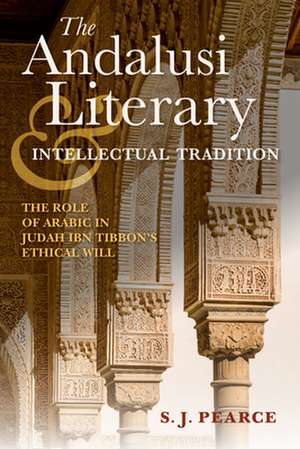The Andalusi Literary and Intellectual Tradition – The Role of Arabic in Judah ibn Tibbon`s Ethical Will: Sephardi and Mizrahi Studies
Autor Sarah J. Pearceen Limba Engleză Hardback – 5 mar 2017
Preț: 383.50 lei
Nou
Puncte Express: 575
Preț estimativ în valută:
73.39€ • 77.17$ • 60.64£
73.39€ • 77.17$ • 60.64£
Carte tipărită la comandă
Livrare economică 17 aprilie-01 mai
Preluare comenzi: 021 569.72.76
Specificații
ISBN-13: 9780253025968
ISBN-10: 0253025966
Pagini: 276
Dimensiuni: 152 x 229 x 15 mm
Greutate: 0.57 kg
Editura: MH – Indiana University Press
Seria Sephardi and Mizrahi Studies
ISBN-10: 0253025966
Pagini: 276
Dimensiuni: 152 x 229 x 15 mm
Greutate: 0.57 kg
Editura: MH – Indiana University Press
Seria Sephardi and Mizrahi Studies
Cuprins
Acknowledgements
A Note on Translations and Transliterations
Introduction: 'The Preface of Every Book Is Its First Part': A Brief Overview of Materials and Methodology
1. 'Pen, I Recount Your Favor': Reading, Writing and Translating in Memory of al-Andalus
2. 'Examine your Hebrew Books Monthly and Arabic Books Bimonthly': Autobiography and Bibliography in the Islamic West
3. 'On Every Sabbath, Read from the Bible in Arabic': Reading the Hebrew Bible as Arabic Literature
4. 'The Words of the Ancient Poets': Poetics Between Jewish and Islamic Scripture
5. 'The Arab Sage Said': Transmitting Arabic Wisdom in Translation
6. 'From Vessel to Vessel': The Reception and Reimagining of the Tibbonid Corpus
Conclusion: "This Book Has Been Completed:" Looking Back and Ahead at al-Andalus in Translation
Appendix: Judah ibn Tibbon's Ethical Will: A New Translation
Bibliography
Index
A Note on Translations and Transliterations
Introduction: 'The Preface of Every Book Is Its First Part': A Brief Overview of Materials and Methodology
1. 'Pen, I Recount Your Favor': Reading, Writing and Translating in Memory of al-Andalus
2. 'Examine your Hebrew Books Monthly and Arabic Books Bimonthly': Autobiography and Bibliography in the Islamic West
3. 'On Every Sabbath, Read from the Bible in Arabic': Reading the Hebrew Bible as Arabic Literature
4. 'The Words of the Ancient Poets': Poetics Between Jewish and Islamic Scripture
5. 'The Arab Sage Said': Transmitting Arabic Wisdom in Translation
6. 'From Vessel to Vessel': The Reception and Reimagining of the Tibbonid Corpus
Conclusion: "This Book Has Been Completed:" Looking Back and Ahead at al-Andalus in Translation
Appendix: Judah ibn Tibbon's Ethical Will: A New Translation
Bibliography
Index
Notă biografică
Descriere
While the letter is full of personal criticism and admonitions, Pearce shows ibn Tibbon making a powerful argument in favor of the continuation of Arabic as a prestige language for Andalusi Jewish readers and writers, even in exile outside of the Islamic world.
















